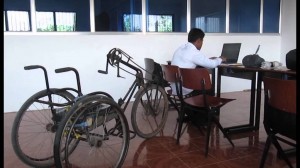(MissionNewsire) Don Bosco Technical School Kep/Hatrans, located in southern Cambodia, has been working to make changes to the school’s buildings and dormitories to ensure they are accessible for students with physical disabilities. In January 2015, Don Bosco Tech was awarded a grant from the Office
(MissionNewswire) In January 2015, the Don Bosco Technical School Kep located in southern Cambodia, was awarded a grant from the Office of American Schools and Hospitals Abroad at the U.S. Agency for International Development (USAID). Don Bosco Kep plans to use the funds to transform the school buildings
(MissionNewswire) Salesian Missions has teamed up with students and professors from Fordham University to carry out a multi-country study to identify “best practices” at Salesian technical vocational training schools around the globe. The Salesians are widely regarded as the largest single provider of technical vocational training
(MissionNewswire) According to UNICEF, almost 50 percent of the developing world’s population – 2.5 billion people – lack improved sanitation facilities, and more than 884 million people still use unsafe drinking water sources. Inadequate access to safe water and sanitation services, coupled with poor hygiene practices, kills and sickens thousands of children every day, and leads to impoverishment and diminished opportunities for thousands more.
Poor sanitation, water and hygiene have many other serious repercussions. Children – and particularly girls – are denied their right to education because schools lack private and decent sanitation facilities. Women are forced to spend large parts of their day fetching water. Poor farmers and wage earners are less productive due to illness, health systems are overwhelmed and national economies suffer. Without WASH (water, sanitation and hygiene), sustainable development is impossible.
Reports published by the World Health Organization, UNICEF and others make it clear that this challenge should no longer be left primarily in the hands of just water management authorities or environmental ministries.
Non-governmental organizations must continue to play a major role in fighting the battle for access to clean water. Many such organizations around the globe have been doing just that, one project and one community at a time.
In a Bolivian community, for example, families now have access to safe drinking water in their homes through community water distribution projects, according to the Salesian Missions website.
In the town of “19 de Agosto” in Santa Cruz de la Sierra, the new distribution brings water directly to 106 families who previously had to carry potable water from the town well to their own homes, According to the Salesian Missions website. The distribution system greatly improves the sanitary conditions of the drinking water. In the town of Las Parabas, 50 families now have water distribution directly into their homes using this system.
Each community and each challenge to safe water access is different and customized solutions must be engineered, the website also points out. For example, to address serious water issues resulting from pesticide pollution in a remote area of western Brazil, Salesian Missions worked with members of the Xavante and Bororo Indian communities to obtain clean water from previously inaccessible areas.
To do so, the Salesians first created wells and designed a mobile drilling truck. Then, to create power, they invented and patented a seesaw pump that would draw water from the depths of the well as children were playing. Now, solar panels are used. The result – according to Salesian Missions – is reduced risk of disease, access to potable water, improved infrastructure and expanded farming.
“What began as an immediate response to a crisis in a community,” the website states, “has become a well-organized project to ensure the growth of the indigenous groups.”
(MissionNewswire) Developing countries could double their food production within 10 years with support for ecological agriculture, according a recent United Nations report. The report, which was presented to the U.N. Human Rights Council, found that “Agroecological” (or “eco-farming”) projects have led to an average crop yield



